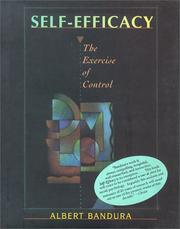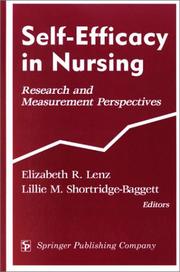| Listing 1 - 10 of 11 | << page >> |
Sort by
|

ISBN: 1593113668 1593113676 9781593113674 9781593113667 9781607527503 1607527502 1281373524 9786611373528 Year: 2006 Publisher: Greenwich, Conn. IAP - Information Age Pub.
Abstract | Keywords | Export | Availability | Bookmark
 Loading...
Loading...Choose an application
- Reference Manager
- EndNote
- RefWorks (Direct export to RefWorks)
The introduction of the psychological construct of self-efficacy is widely acknowledged as one of the most important developments in the history of psychology. Today, it is simply not possible to explain phenomena such as human motivation, learning, self-regulation, and accomplishment without discussing the role played by self-efficacy beliefs. In this, the fifth volume of our series on adolescence and education, we focus on the self-efficacy beliefs of adolescents. We are proud and fortunate to be able to bring together the most prominent voices in the study of self-efficacy, including that of the Father of Social Cognitive Theory and of self-efficacy, Professor Albert Bandura. It is our hope, and our expectation, that this volume will become required reading for all students and scholars in the areas of adolescence and of motivation and, of course, for all who play a pivotal role in the education and care of youth.
Self-efficacy --- Adolescent psychology --- Efficacy expectations --- Expectancies of self-efficacy --- Expectations of self-efficacy --- Self-efficacy expectancies --- Self-efficacy expectations --- Psychology, Applied --- Adolescence --- Teenagers --- Psychology --- Self-efficacy. --- Adolescent psychology.

ISBN: 0716728508 9780716728504 Year: 1997 Publisher: New York, N.Y. Freeman
Abstract | Keywords | Export | Availability | Bookmark
 Loading...
Loading...Choose an application
- Reference Manager
- EndNote
- RefWorks (Direct export to RefWorks)
Developmental psychology --- Self-efficacy --- Control (Psychology) --- Control (Psychology). --- Self-efficacy. --- Sociale psychologie --- sociale cognitie --- #KVHB:Controle --- #KVHB:Sociale psychologie --- #KVHB:Gedrag --- sociale cognitie. --- Efficacy expectations --- Expectancies of self-efficacy --- Expectations of self-efficacy --- Self-efficacy expectancies --- Self-efficacy expectations --- Psychology, Applied --- Power (Psychology) --- Emotions --- Psychology --- Senses and sensation

ISBN: 0306448750 1475764987 1441968687 9780306448751 Year: 1995 Publisher: New York (N.Y.): Plenum
Abstract | Keywords | Export | Availability | Bookmark
 Loading...
Loading...Choose an application
- Reference Manager
- EndNote
- RefWorks (Direct export to RefWorks)
Adaptability (Psychology) --- Adjustment (Psychology) --- Adjustment disorders --- Self-efficacy --- Efficacy expectations --- Expectancies of self-efficacy --- Expectations of self-efficacy --- Self-efficacy expectancies --- Self-efficacy expectations --- Psychology, Applied --- Depression, Reactive --- Disorders, Adjustment --- Maladjustment (Psychology) --- Reactive depression --- Reactive disorders --- Transient situational disturbances --- Psychology, Pathological --- Accommodation (Psychology) --- Adaptation (Psychology) --- Adapting behavior --- Adaptive behavior --- Coping behavior --- Personality --- Psychology --- Flexibility (Psychology) --- Malleability (Psychology)
Book
ISBN: 9463005196 9463005218 946300520X Year: 2016 Publisher: Rotterdam, Netherlands ; Boston, [Massachusetts] ; Taipei, [Taiwan] : Sense Publishers,
Abstract | Keywords | Export | Availability | Bookmark
 Loading...
Loading...Choose an application
- Reference Manager
- EndNote
- RefWorks (Direct export to RefWorks)
In this book the editors have been able to provide a snapshot of current research being undertaken in the Asia-Pacific region in regards to teacher self-efficacy beliefs. This includes specific focuses on inclusive teaching, professionalism, subject domains, collective efficacy as well as specific contexts of early childhood education and care, primary schools education, special needs schools and teacher education. This allows the reader to begin to develop an understanding about the complexity of teacher self-efficacy as well as the development and relationship between self-efficacy and other theoretical constructs and concepts. The book begins with an overall summary of research in the Asia-Pacific region before moving to a specific focus on research in different countries. All of the chapters also provide hope to the reader about the possibilities of understanding and supporting teachers and schools beliefs to enhance teacher behaviour. Through the implementation of teacher self-efficacy beliefs into educational contexts, teacher education programmes and professional development programmes, there is strong hope that the outcomes of education systems in supporting all students in their learning can be achieved. By allowing teachers to develop their own sources of efficacy and supporting these through all stages of career development, all children can be supported in their own learning.
Education. --- Education, general. --- Self-efficacy. --- Teachers --- Psychology. --- Faculty (Education) --- Instructors --- School teachers --- Schoolteachers --- Efficacy expectations --- Expectancies of self-efficacy --- Expectations of self-efficacy --- Self-efficacy expectancies --- Self-efficacy expectations --- School employees --- Psychology, Applied --- Children --- Education, Primitive --- Education of children --- Human resource development --- Instruction --- Pedagogy --- Schooling --- Students --- Youth --- Civilization --- Learning and scholarship --- Mental discipline --- Schools --- Teaching --- Training --- Education --- Teacher effectiveness --- Teacher quality --- Effective teaching

ISBN: 030644934X 1489912827 1489912800 Year: 1995 Publisher: New York (N.Y.): Plenum
Abstract | Keywords | Export | Availability | Bookmark
 Loading...
Loading...Choose an application
- Reference Manager
- EndNote
- RefWorks (Direct export to RefWorks)
Self-efficacy --- Self-esteem --- Self-perception --- Self-concept --- Self image --- Self-understanding --- Perception --- Self-discrepancy theory --- Self-evaluation --- Self-love (Psychology) --- Self-respect --- Self-worth --- Respect for persons --- Narcissistic injuries --- Efficacy expectations --- Expectancies of self-efficacy --- Expectations of self-efficacy --- Self-efficacy expectancies --- Self-efficacy expectations --- Psychology, Applied --- Self-efficacy. --- Self-esteem. --- Self-perception. --- Sociale psychologie --- sociale cognitie --- sociale cognitie.

ISBN: 0521474671 0521586968 1139930338 1139243578 1139931733 1139939246 0511527691 1139929518 1139933736 113993693X 9781139939249 9781139931731 9780521474672 9780521586962 9780511527692 9781139243575 9781139930338 9781139929516 9781139933735 9780511527692 Year: 1995 Publisher: Cambridge (Mass.): University press
Abstract | Keywords | Export | Availability | Bookmark
 Loading...
Loading...Choose an application
- Reference Manager
- EndNote
- RefWorks (Direct export to RefWorks)
Adolescents' beliefs in their personal control affects their psychological well-being and the direction their lives take. Self-Efficacy in Changing Societies analyzes the diverse ways in which beliefs of personal efficacy operate within a network of sociocultural influences to shape life paths. The chapters, by internationally known experts, cover such concepts as infancy and personal agency, competency through the life span, the role of family, and cross-cultural factors.
Adaptability (Psychology) --- Control (Psychology) --- Self-efficacy --- Congresses. --- Personality development --- -Control (Psychology) --- -Self-efficacy --- -Efficacy expectations --- Expectancies of self-efficacy --- Expectations of self-efficacy --- Self-efficacy expectancies --- Self-efficacy expectations --- Psychology, Applied --- Power (Psychology) --- Emotions --- Psychology --- Senses and sensation --- Adaptation (Psychology) --- Adaptive behavior --- Flexibility (Psychology) --- Malleability (Psychology) --- Personality --- Adjustment (Psychology) --- Congresses --- Developmental psychology --- Efficacy expectations --- Health Sciences --- Psychiatry & Psychology
Book
ISBN: 3319998587 3319998579 Year: 2018 Publisher: Cham : Springer International Publishing : Imprint: Springer,
Abstract | Keywords | Export | Availability | Bookmark
 Loading...
Loading...Choose an application
- Reference Manager
- EndNote
- RefWorks (Direct export to RefWorks)
This edited volume contains reports of current research, and literature reviews of research, involving self-efficacy in various instructional technology contexts. Chapter represent international perspectives across the broad areas of K-12 education, higher education, teacher self-efficacy, and learner self-efficacy to capture a diverse cross section of research on these topics. The book includes reviews of existing literature and reports of new research, thus creating a comprehensive resource for researchers and designers interested in this general topic. A system of peer review was implemented to select the work that appears in the book from a collection of author-submitted chapter proposals. The book is especially relevant to students and researchers in educational technology, instructional technology, instructional design, learning sciences, and educational psychology.
Self-efficacy. --- Efficacy expectations --- Expectancies of self-efficacy --- Expectations of self-efficacy --- Self-efficacy expectancies --- Self-efficacy expectations --- Psychology, Applied --- Education. --- Educational psychology. --- Psychic research. --- Educational Technology. --- Educational Psychology. --- Psychology Research. --- Education --- Psychology, Educational --- Psychology --- Child psychology --- Children --- Education, Primitive --- Education of children --- Human resource development --- Instruction --- Pedagogy --- Schooling --- Students --- Youth --- Civilization --- Learning and scholarship --- Mental discipline --- Schools --- Teaching --- Training --- Educational technology. --- Education—Psychology. --- Experiential research. --- Research --- Instructional technology --- Technology in education --- Technology --- Educational innovations --- Instructional systems --- Aids and devices

ISBN: 1281806684 9786611806682 0826115594 9780826115591 9781281806680 0826115632 9780826115638 Year: 2002 Publisher: New York Springer Pub.
Abstract | Keywords | Export | Availability | Bookmark
 Loading...
Loading...Choose an application
- Reference Manager
- EndNote
- RefWorks (Direct export to RefWorks)
Self efficacy, or the belief that one can self-manage one's own health, is an important goal of health care providers, particularly in chronic illness. This book explores the concept of self efficacy from theory, research, measurement, and practice perspectives. The core of the book is an international collaboration of nurses from the U.S. and the Netherlands who have developed tools for promoting and measuring self efficacy in diabetes management.
Self-efficacy. --- Control (Psychology) --- Nursing. --- Clinical nursing --- Nurses and nursing --- Nursing process --- Care of the sick --- Medicine --- Power (Psychology) --- Emotions --- Psychology --- Senses and sensation --- Efficacy expectations --- Expectancies of self-efficacy --- Expectations of self-efficacy --- Self-efficacy expectancies --- Self-efficacy expectations --- Psychology, Applied --- Nursing assessment. --- Assessment, Nursing --- Clinical assessment in nursing --- Health assessment, Nursing --- Nursing health assessment --- Nursing observation --- Observation, Nursing --- Patient assessment in nursing --- Nursing
Book
ISBN: 884701526X 8847015278 Year: 2010 Publisher: Milano : Springer,
Abstract | Keywords | Export | Availability | Bookmark
 Loading...
Loading...Choose an application
- Reference Manager
- EndNote
- RefWorks (Direct export to RefWorks)
Uno degli interrogativi più pregnanti della moderna psicologia è quello inerente alle potenzialità umane: perché un individuo è più forte, più agile, più dinamico e creativo rispetto ad un altro pur avendo lo stesso quoziente intellettivo? Quali sono i fattori che rendono una persona meno vulnerabile allo sviluppo di condizioni di disagio psichico? Quali sono i fattori che rendono una persona più brillante ed efficace? Come si può accrescere il proprio talento, essere leader di se stessi? È questa la vera sfida della psicologia del positivo che, avendo superato i legami con il modello del patologico, si pone come paradigma fondamentale per lo sviluppo di stili di vita vincenti attraverso percorsi formativi innovativi. Il cambiamento di prospettiva è determinante e radicale; oggi si parte dal presupposto che la mente umana, nei suoi aspetti cognitivi ed emotivi, possieda le energie sufficienti allo sviluppo di personalità mature ed efficaci, con confini ben strutturati e un Io consapevole e forte. L’autoefficacia esprime le grandi potenzialità della mente umana di rappresentare se stessi in modo coerente, in un dinamismo continuo e positivo, in grado di rendere l’individuo resiliente, capace di autodeterminarsi rispetto alle difficoltà della vita quotidiana. La gestione dello stress si apre a nuove dimensioni, non appare più come una semplice “resistenza”alle avversità e alle difficoltà della vita, quanto una nuova modalità di gestirsi in termini proattivi, che porta ad avere una visione del mondo più positiva e ottimistica.
Emotions. --- Personality. --- Psychology. --- Self-actualization (Psychology). --- Social Sciences --- Psychology --- Self-efficacy. --- Efficacy expectations --- Expectancies of self-efficacy --- Expectations of self-efficacy --- Self-efficacy expectancies --- Self-efficacy expectations --- Personal identity --- Personality theory --- Personality traits --- Personology --- Traits, Personality --- Business. --- Management science. --- Management. --- Psychiatry. --- Industrial psychology. --- Psychology, general. --- Business and Management, general. --- Industrial, Organisational and Economic Psychology. --- Psychology, Applied --- Personality psychology --- Individuality --- Persons --- Self --- Temperament --- Philosophy (General). --- Applied psychology. --- Industrial and Organizational Psychology. --- Medicine and psychology --- Mental health --- Psychology, Pathological --- Applied psychology --- Psychagogy --- Psychology, Practical --- Social psychotechnics --- Trade --- Economics --- Management --- Commerce --- Industrial management --- Administration --- Industrial relations --- Organization --- Business psychology --- Industrial psychology --- Psychotechnics --- Industrial engineering --- Personnel management --- Industrial psychologists --- Quantitative business analysis --- Problem solving --- Operations research --- Statistical decision --- Behavioral sciences --- Mental philosophy --- Mind --- Science, Mental --- Human biology --- Philosophy --- Soul
Book
ISBN: 9811682399 9811682402 Year: 2022 Publisher: Gateway East, Singapore : Springer,
Abstract | Keywords | Export | Availability | Bookmark
 Loading...
Loading...Choose an application
- Reference Manager
- EndNote
- RefWorks (Direct export to RefWorks)
Educational tests and measurements. --- Self-efficacy. --- Education, Higher --- Tests i proves en educació --- Autoeficàcia --- Educació superior --- Evaluation. --- Educació universitària --- Ensenyament superior --- Ensenyament universitari --- Estudis superiors --- Estudis universitaris --- Etapes educatives --- Abandó dels estudis (Educació superior) --- Competències transversals --- Educació clàssica --- Educació superior transfronterera --- Ensenyament de la biblioteconomia --- Estudis de postgrau --- Extensió universitària --- Lectura (Educació superior) --- Orientació en l'educació superior --- Primer cicle d'ensenyament universitari --- Seminaris --- Tercer cicle d'ensenyament universitari --- Campus virtuals --- Escrits acadèmics --- Pràcticums --- Universitats --- Eficàcia personal --- Expectatives d'eficàcia personal --- Psicologia aplicada --- Mesuraments en educació --- Mesuraments i proves educatives --- Proves en educació --- Tests en educació --- Psicometria --- Proves d'accés a la universitat --- Qualificacions (Ensenyament) --- Tests de lectura --- Avaluació dels alumnes --- Avaluació dels estudiants --- Tests --- Efficacy expectations --- Expectancies of self-efficacy --- Expectations of self-efficacy --- Self-efficacy expectancies --- Self-efficacy expectations --- Psychology, Applied --- Educational assessment --- Educational measurements --- Mental tests --- Tests and measurements in education --- Psychological tests for children --- Psychometrics --- Students --- Examinations --- Psychological tests --- Rating of
| Listing 1 - 10 of 11 | << page >> |
Sort by
|

 Search
Search Feedback
Feedback About UniCat
About UniCat  Help
Help News
News